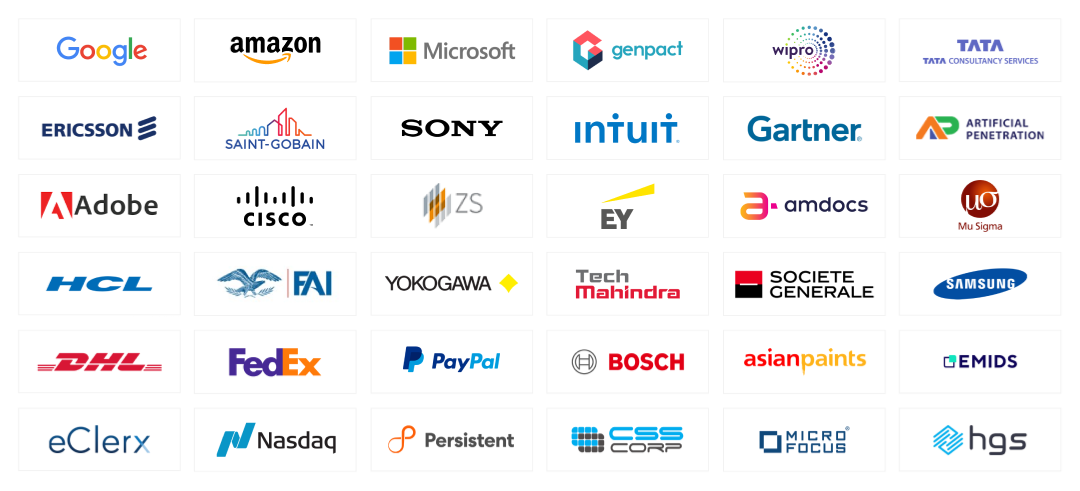Home » Cloud Computing Certification Course
Cloud Computing Certification Course
Become a Cloud Computing Certification Professional with the Elearners365 Course!
- Cloud Computing Fundamentals
- Programming Skills for Cloud Platforms
- Cloud-based Machine Learning
- Data Visualization in the Cloud
Key Highlights

40 hours of guided instruction

Certification upon completion

Hands-on projects

Flexible scheduling options

Job placement support

Ongoing support from mentors

Comprehensive curriculum

Live classes held daily
Cloud Computing Course Overview
This course provides a thorough understanding of cloud computing principles, focusing on infrastructure, platform, and software services, and practical application through AWS, Azure, and Google Cloud.
In this course, you’ll gain knowledge on cloud computing concepts and architectures, acquire hands-on experience with leading cloud platforms like AWS, Azure, and Google Cloud, learn to deploy and manage cloud-based applications and services, and understand scalability, security, and cost management in cloud environments.
This course is suitable for IT professionals aiming to enhance their cloud computing skills, software developers interested in deploying applications on the cloud, and entrepreneurs seeking to leverage cloud technology for their businesses.
Basic familiarity with computer networks and operating systems, proficiency in programming languages like Python, Java, or JavaScript, and understanding of virtualization concepts are beneficial but not mandatory.
Enrolling in this online course offers a comprehensive curriculum covering essential cloud computing concepts and practical skills, flexible learning options from any location with internet access, guidance from expert instructors with industry experience, hands-on labs and projects for practical application, and affordable pricing with access to additional learning resources like e-books, videos, and community forums.
Cloud Computing Career Transition
Transitioning into a cloud computing career entails developing skills in cloud infrastructure, deployment, and management, typically through formal education, self-directed learning, or specialized bootcamps, to pursue opportunities in cloud-based industries.

Average salary increase of 45%

30 LPA Highest Salary

Expert in Cloud Computing

Engage with professional networks
Skills Covered
- Cloud infrastructure setup
- Deployment and management
- Scalability and elasticity
- Security and compliance
- Proficiency in leading cloud platforms
- Containerization technologies
- Serverless computing
- DevOps practices
- Cloud cost management
Tools Coverd












Cost of Enrolling in Cloud Computing Training
Understanding the costs associated with enrolling in cloud computing training is essential for making informed decisions about investing in your education. By assessing expenses in relation to potential benefits, individuals can determine the value of pursuing such learning opportunities.
Group Batch
Rs 25,000
- Learning Mode: Online Instructer led
- Learn from anywhere
- Learn from Industry Expert
- Daily Live Classes: 2 Hours
- Dedicated Doubt Resolution Sessions
- 90 Hours Course Duration
- Course Completion Certification
- 3-Month No-Cost EMI Available
- Job Assistance Provided
New Batch Starts Every Week
Upto 10 Student
1:1 Batch
Rs 60,000
- Learning Mode: Online Instructer led
- Learn from anywhere
- Learn from Industry Expert
- Daily Live Classes: 2 Hours
- Dedicated Doubt Resolution Sessions
- 90 Hours Course Duration
- Course Completion Certification
- 6 Month No-cost Emi Avilable
- Job Assistance Provided
New Batch Starts Every Week
Single Student
Cloud Computing Course Syllabus
- Live Classes
Computer Fundamentals
OS and File Management
- Windows OS
- Linux OS
Windows Server Fundamentals
- Windows Deployment Services
- Active Directory
- Group Policy
- Remote Access
- Virtualization(Hyper-V)
- Updates and Patching(WSUS)
- PowerShell DSC
Networking Fundamentals
- IP addressing
- DNS, DHCP
- OSI, TCP/IP, Wi-Fi,
- Network security
Cloud Fundamentals
- IaaS, PaaS, SaaS
- Deployment Models
OS Security Fundamentals
- OS Hardening
- Security Configuration
- Access Control
- Compliance & Regulation (HIPAA)
Network Security Fundamentals
- Firewall
- Logs and Events
- VPN, IDS, Access Control
- Security Operation Monitoring
Virtualization and Monitoring
- VMware Fundamentals
- vSphere and ESXi
- Managing Virtual Networks
- Managing Virtual Storage
- Resource Management & Monitoring
- vSphere Clusters
- vSphere Lifecycle Management
Microsoft Azure
- Identity
- Role-based Access Control (RBAC)
- ARM Templates
- Azure DNS and Firewall
- VNet Peering
- Network routing & Load Balancer
- Azure Storage
- Azure Virtual Machine
- Azure Security Center
- Azure Virtual Networks
- Hybrid Networking
- Azure ExpressRoute
- Azure Network Security
- Private Access to Azure Services
Amazon Web Services
- System Operations on AWS
- System Discovery
- Deploy and Update Resources
- Automate Resource Deployment
- Manage Resources
- Automate Scaling
- Monitor and Maintain System Health
- Data Security and System Auditing
- Operate Secure and Resilient Networks
- Object Storage
- Cost Reporting, Alerts, and Optimization
Google Cloud Platform
- Introduction to vSphere and the Software-Defined Data Center
- Virtual Machines
- vCenter Server
- Configuring and Managing Virtual Networks
- Configuring and Managing Virtual Storage
- Virtual Machine Management
- Windows Server Migration
- Network Troubleshooting
- OS Troubleshooting
- Cloud Troubleshooting
- 10+ Case Studies
- Additional: Docker, Kubernetes, DevOps
Course Enquiry
Cloud Computing Projects
Cloud Computing Certification
In this Cloud Computing Certification, you will learn essential concepts of cloud computing including infrastructure setup, deployment strategies, security considerations, cost management techniques, and hands-on experience with leading cloud platforms such as AWS, Azure, and Google Cloud. Additionally, you’ll gain proficiency in containerization technologies, serverless computing, DevOps practices, and cloud-based IoT data analytics.
To become a certified Data Scientist, you can pursue professional certification programs offered by renowned organizations or educational institutions. These programs typically require completion of specific coursework, hands-on projects, and passing a certification exam. Additionally, gaining practical experience through internships or working on data science projects can also enhance your qualifications and prepare you for certification.
The roles and responsibilities of a Data Scientist typically involve analyzing large datasets, identifying trends and patterns, developing predictive models, and communicating insights to stakeholders. Data Scientists also collaborate with cross-functional teams to solve complex business problems, optimize processes, and drive data-driven decision-making across organizations.
The validity period of a Cloud Computing Certification varies depending on the certifying body and the specific certification program. Typically, certifications remain valid for a certain number of years, after which you may need to renew or recertify to demonstrate continued proficiency and knowledge in cloud computing. It’s essential to check the certification provider’s policies regarding renewal requirements and expiration dates to ensure your certification remains current and relevant in the rapidly evolving field of cloud computing.

Placement Target Companies

Cloud Computing Certification Training FAQs
Cloud computing is the delivery of computing services—including servers, storage, databases, networking, software, analytics, and intelligence—over the internet (“the cloud”) to offer faster innovation, flexible resources, and economies of scale. It is important because it allows organizations to access computing resources on-demand without the need for extensive hardware infrastructure, enabling cost savings, scalability, and agility in technology deployment.
Prerequisites for enrolling in a cloud computing course may vary depending on the specific course and provider. However, basic knowledge of computer networking, operating systems, and programming languages like Python is often beneficial. Familiarity with concepts such as virtualization and experience with IT infrastructure management are also helpful but not always required.
Cloud computing professionals have a wide range of career opportunities in various industries and roles. Some common job titles include Cloud Architect, Cloud Engineer, DevOps Engineer, Cloud Solutions Architect, Cloud Consultant, and Cloud Security Specialist. Cloud computing skills are in high demand as organizations increasingly adopt cloud technology to drive innovation and efficiency in their operations.
Cloud computing professionals have a wide range of career opportunities in various industries and roles. Some common job titles include Cloud Architect, Cloud Engineer, DevOps Engineer, Cloud Solutions Architect, Cloud Consultant, and Cloud Security Specialist. Cloud computing skills are in high demand as organizations increasingly adopt cloud technology to drive innovation and efficiency in their operations.
To prepare for a cloud computing course, you can start by familiarizing yourself with basic concepts of cloud computing through online resources, tutorials, and introductory courses. It’s also beneficial to brush up on relevant skills such as networking, programming, and IT infrastructure management. Additionally, setting clear learning goals, staying organized, and actively engaging in course materials and exercises can help maximize your learning outcomes.
During a cloud computing course, students typically have access to a variety of support and resources, including online lectures, interactive tutorials, practical exercises, discussion forums, and instructor guidance. Some courses may also offer live Q&A sessions, mentorship opportunities, and access to supplementary learning materials such as e-books, videos, and case studies to enhance the learning experience.
To evaluate the quality and credibility of a cloud computing course, consider factors such as the course curriculum, instructor expertise, accreditation or certifications, student reviews and testimonials, and industry recognition. Look for courses offered by reputable educational institutions or recognized certification providers, and assess whether the course content aligns with your learning objectives and career goals. Additionally, researching the success stories of past students and examining the course outcomes and certifications offered can help gauge the value of the course.
